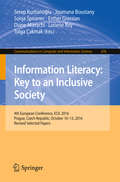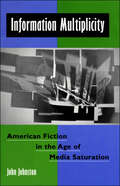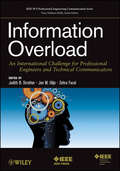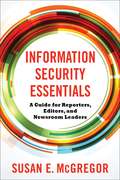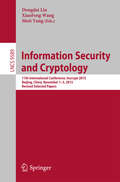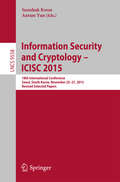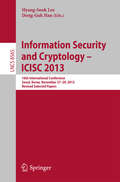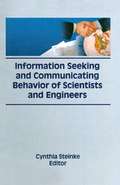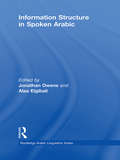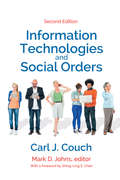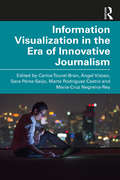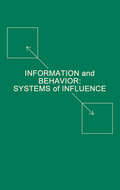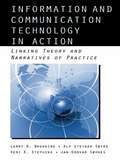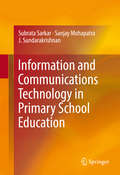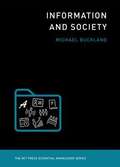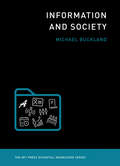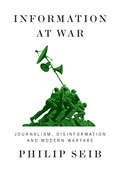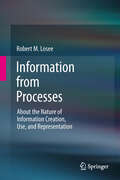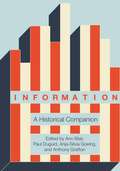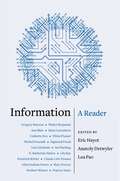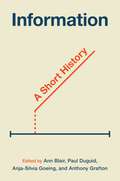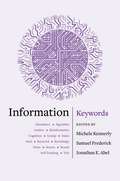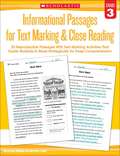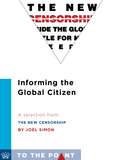- Table View
- List View
Information Literacy: Key to an Inclusive Society
by Serap Kurbanoğlu Joumana Boustany Sonja Špiranec Esther Grassian Diane Mizrachi Loriene Roy Tolga ÇakmakThis book constitutes revised selected papers from the 4th European Conference on Information Literacy, ECIL 2016, held in Prague, Czech Republic, in October 2016. The 52 full and 19 short papers presented in this volume were carefully reviewed and selected from 259 submissions. They were organized in topical sections named: inclusive society and democracy; employability and workplace; various literacies; reading preference: print vs electronic; theoretical aspects; higher education; discipline based studies; research methods; children and youth; country based studies; academic libraries; librarians; and teaching methods and instruction.
Information Multiplicity: American Fiction in the Age of Media Saturation
by John Johnston"With the birth of information theory and cybernetics in the late 1940s and early 1950s," writes John Johnston, "a decisive step was taken toward the immense techno-scientific transformation of the world into coded bits of 'information' and machinic assemblages." Beginning with Thomas Pynchon's The Crying of Lot 49, the novels that have reflected this transformation have similarly assembled disparate bits of information and narrative into fictions saturated with data and transcribed "clips" from media such as motion pictures, television, recordings, and computer files.Realism having thus fractilized into high-speed collage, thought itself is redefined from the High Modernist "stream of consciousness" into what the machine psychologist Daniel Dennett refers to as "multiple drafts" or "circuits" operating concurrently in the human brain. In a series of close readings, Johnston traces how this viral influx of information into human consciousness has been replicated in works by Thomas Pynchon (Gravity's Rainbow and Vineland), Joseph McElroy (Lookout Cartridge), William Gaddis (J.R.), Don DeLillo (Libra), and William Gibson (Necromancer).From John Johnston's Introduction: "Information multiplicities are profoundly corrosive of older cultural forms and identities, dissolving both subjects and objects alike into systems, processes and nodes in the circuits and flow of information exchange. But they also bring about new kinds of energy and even strange new forms of 'artificial life.'... Contemporary culture—or more specifically what is called postmordern techno- or cyberculture—is a restructuring process that can similarly be described: as an artifactual space created when information re-structures modern or traditional culture in order to make it a better habitat for information."
Information Overload: An International Challenge for Professional Engineers and Technical Communicators
by Jan M. Ulijn Judith B. Strother Zohra FazalA unique approach to information overload, combining theory and practical solutions Written and edited by an international group of experts from academia and industry, Information Overload clearly links academic theory to real-world practice, providing a truly global and interdisciplinary treatment of this important topic. Emphasizing the role of engineers and technical communicators, the book discusses the root causes and costs of information overload within organizations and introduces strategies and proven techniques for reducing information overload and minimizing its negative impact. It offers a theoretical framework and ideas for future research, and features special chapter 'insight boxes' that recount different approaches to problems from various multinational corporations. Information Overload: Focuses on key definitions and challenges of information overload for both communicators and organizations Details a variety of technical and human-centered strategies for addressing the deluge of data Presents effective solutions tried at IBM, Xerox, and Harris Corporation Examines the effects of culture as well as that of color, visual form, text, and end-user documentation Offers an engineering perspective on the technologies available for dealing with information overload Information Overload also serves as a first-rate survival manual for researchers in academia, practicing engineers, technical communicators, and managers and professionals at all levels of profit and nonprofit organizations.
Information Security Essentials: A Guide for Reporters, Editors, and Newsroom Leaders
by Susan E. McGregorAs technological and legal changes have hollowed out the protections that reporters and news organizations have depended upon for decades, information security concerns facing journalists as they report, produce, and disseminate the news have only intensified. From source prosecutions to physical attacks and online harassment, the last two decades have seen a dramatic increase in the risks faced by journalists at all levels even as the media industry confronts drastic cutbacks in budgets and staff. As a result, few professional or aspiring journalists have a comprehensive understanding of what is required to keep their sources, stories, colleagues, and reputations safe.This book is an essential guide to protecting news writers, sources, and organizations in the digital era. Susan E. McGregor provides a systematic understanding of the key technical, legal, and conceptual issues that anyone teaching, studying, or practicing journalism should know. Bringing together expert insights from both leading academics and security professionals who work at and with news organizations from BuzzFeed to the Associated Press, she lays out key principles and approaches for building information security into journalistic practice. McGregor draws on firsthand experience as a Wall Street Journal staffer, followed by a decade of researching, testing, and developing information security tools and practices. Filled with practical but evergreen advice that can enhance the security and efficacy of everything from daily beat reporting to long-term investigative projects, Information Security Essentials is a vital tool for journalists at all levels.
Information Security and Cryptology
by Moti Yung Dongdai Lin Xiaofeng WangThis book constitutes the thoroughly refereed post-conference proceedings of the 11th International Conference on Information Security and Cryptology, Inscrypt 2015, held in Beijing, China in November 2015. The 27 revised full papers presented were carefully reviewed and selected from 79 submissions. The papers are organized in topical sections on hash function; signature schemes; symmetric ciphers; elliptic curve and cryptographic fundamentals; Web and applications security; cloud security; key management and public key encryption; zero knowledge and secure computations; software and mobile security.
Information Security and Cryptology - ICISC 2015
by Soonhak Kwon Aaram YunThis book constitutes the thoroughly refereedpost-conference proceedings of the 18th International Conference on InformationSecurity and Cryptology, ICISC 2015, held in Seoul, South Korea, in November2015. The 23 revised full papers presented were carefullyselected from 84 submissions during two rounds of reviewing and improvement. The papers provide the latest results in research, development and applicationsin the field of information security and cryptology. They are grouped aroundthe following topics: digital signatures; public-key cryptography; block ciphercryptanalysis; elliptic curve cryptography; protocols; security; side-channelattacks.
Information Security and Cryptology -- ICISC 2013
by Hyang-Sook Lee Dong-Guk HanThis book constitutes the thoroughly refereed post-conference proceedings of the 16th International Conference on Information Security and Cryptology, ICISC 2013, held in Seoul, Korea in November 2013. The 31 revised full papers presented together with 2 invited talks were carefully selected from 126 submissions during two rounds of reviewing. The papers provide the latest results in research, development and applications in the field of information security and cryptology. They are organized in topical sections on secure multiparty computation, proxy re-encryption, side channel analysis and its countermeasures, cryptanalysis, embedded system security and its implementation, primitives for cryptography, digital signature, security protocol, cyber security, and public key cryptography.
Information Seeking and Communicating Behavior of Scientists and Engineers
by Cynthia SteinkeThis inspiring book addresses a topic that is far too often ignored or disregarded by sci-tech librarians: Exactly how do scientists and engineers really discover, select, and use the countless information and communications resources available to them when conducting research? The answer to this question should be a major influence on the way information specialists develop information systems in their libraries. Unfortunately, many librarians are not as familiar with the work, information needs, and communicating behavior of the research worker. Information Seeking and Communications Behavior of Scientists and Engineers looks at this question from several perspectives to give an overall view of how to best serve the needs of the scientific community.This book is an encouragement and a challenge to sci-tech librarians to make an ever greater effort to understand the work of their users, the differing information channels and sources they employ, and thus tailor the library’s systems and services to best support their information-seeking behavior.
Information Structure in Spoken Arabic (Routledge Arabic Linguistics Series)
by Jonathan OwensThis book explores speakers’ intentions, and the structural and pragmatic resources they employ, in spoken Arabic – which is different in many essential respects from literary Arabic. Based on new empirical findings from across the Arabic world this book elucidates the many ways in which context and the goals and intentions of the speaker inform and constrain linguistic structure in spoken Arabic. This is the first book to provide an in-depth analysis of information structure in spoken Arabic, which is based on language as it is actually used, not on normatively-given grammar. Written by leading experts in Arabic linguistics, the studies evaluate the ways in which relevant parts of a message in spoken Arabic are encoded, highlighted or obscured. It covers a broad range of issues from across the Arabic-speaking world, including the discourse-sensitive properties of word order variation, the use of intonation for information focussing, the differential role of native Arabic and second languages to encode information in a codeswitching context, and the need for cultural contextualization to understand the role of "disinformation" structure. The studies combine a strong empirical basis with methodological and theoretical issues drawn from a number of different perspectives including pragmatic theory, language contact, instrumental prosodic analysis and (de-)grammaticalization theory. The introductory chapter embeds the project within the deeper Arabic grammatical tradition, as elaborated by the eleventh century grammarian Abdul Qahir al-Jurjani. This book provides an invaluable comprehensive introduction to an important, yet understudied, component of spoken Arabic.
Information Technologies and Social Orders (Communication And Social Order Ser.)
by Carl J. CouchAccording to Carl J. Couch, the history of human society is one of successive, sometimes overlapping, information technologies used to process the various symbolic representations that inform social contexts. Unlike earlier “media” theorists who ignored social context in order to concentrate on the information technologies themselves, Couch implements a consistent theory of interpersonal and intergroup relations to describe the essential interface between information technologies and the social contexts in which they are used. Couch emphasizes the formative capacities of information technologies across historical epochs and cultures, and places them within the major institutional relations of various societies. He views social orders as reflexively shaped by the information technologies that participants use, and as susceptible to mass brutality and oppression due to oligarchic control though he hopes technology will remain humane. The original edition of this manuscript was nearly complete at the time of Couch’s death and was brought to completion by two of his closest associates. Now after two decades, during which its impact is indisputable, it has been updated for a new generation of students and scholars. Additions include discussions on books in the digital age, social media, mobile telephones, recordings, participatory culture, and more.
Information Visualization in The Era of Innovative Journalism
by Carlos Toural-BranInformation Visualization in the Era of Innovative Journalism brings together over 30 authors from countries around the world to synthesize how recent technological innovations have impacted the development, practice and consumption of contemporary journalism. As technology rapidly progresses, shifts, and innovates, there have been immense changes in the way we communicate. This book collects research from around the world that takes an in-depth look at the primary transformations related to journalistic innovation in recent times. High-profile contributors provide cutting-edge scholarship on innovation in journalism as it relates to emergent topics such as virtual reality, podcasting, multimedia infographics, social media, mobile storytelling and others. The book pays special attention to the development of information visualization and the ability of recent innovations to meet audience needs and desires. Students and scholars studying contemporary journalism history and practice will find this a vital and up-to-date resource, as well as those studying communication technology as it relates to marketing, PR or mass media broadly.
Information and Behavior: Systems of Influence (Routledge Communication Series)
by Richard A. WinettFirst Published in 1986. Routledge is an imprint of Taylor & Francis, an informa company.
Information and Communication Technologies in Action: Linking Theories and Narratives of Practice
by Larry D. Browning Alf Steinar Saetre Keri Stephens Jan-Oddvar SornesThis book combines 20 stories from a variety of organizations with a selection of nine theories, both mainstream and emerging. The stories introduce readers to individuals talking about how they communicate today via information and communication technologies (ICTs) in business or organizational contexts. The theories, presented in accessible language, illuminate the implicit patterns in these stories. This book demonstrates how and why these technologies are used under myriad circumstances.
Information and Communications Technology in Primary School Education
by Sanjay Mohapatra Subrata Sarkar J. SundarakrishnanThe main focus of this monograph is to discuss the role of technology in education in emerging markets considering that many countries have attempted to reform their educational systems using large scale interventions in the last two decades. Educational change can be prompted by two exact opposites in two different settings; for example, Western countries are faced with the problem of falling enrollments whereas developing countries have to adjust to rapid acceleration in enrollments. Based on the need to bring about change, these reforms subscribe to a large diversity including attempts at restructuring school systems, curriculum revisions, pedagogical change, technological change, assessment- related changes, work condition changes, and so on. Although there have been reforms in schools over the last century, they have been only first order classroom reforms; a 'deep-seated continuity' still persists in both schooling and teaching. Educational reforms are therefore plagued with different kinds of problems: the problem of successful initial change taking place, the problem of replicating successful change in varying contexts, and the problem of institutionalization or durability of the change. Readers will also discover that American India Foundation, having worked in the educational sphere for more than a decade, intends to transform the school ecosystem through its 'Digital Equalizer' Program (DE). The program strives to foster an environment of collaborative learning by effectively empowering teachers to use technology as a pedagogic tool leading to better learning outcomes among students of under-resourced schools across India. The author sheds new light on how the DE program is affecting change in the state of Odisha's education system and the adoption of new pedagogic teaching techniques.
Information and Society
by Michael BucklandWe live in an information society, or so we are often told. But what does that mean? This volume in the MIT Press Essential Knowledge series offers a concise, informal account of the ways in which information and society are related and of our ever-increasing dependence on a complex multiplicity of messages, records, documents, and data. Using information in its everyday, nonspecialized sense, Michael Buckland explores the influence of information on what we know, the role of communication and recorded information in our daily lives, and the difficulty (or ease) of finding information. He shows that all this involves human perception, social behavior, changing technologies, and issues of trust.Buckland argues that every society is an "information society"; a "non-information society" would be a contradiction in terms. But the shift from oral and gestural communication to documents, and the wider use of documents facilitated by new technologies, have made our society particularly information intensive. Buckland describes the rising flood of data, documents, and records, outlines the dramatic long-term growth of documents, and traces the rise of techniques to cope with them. He examines the physical manifestation of information as documents, the emergence of data sets, and how documents and data are discovered and used. He explores what individuals and societies do with information; offers a basic summary of how collected documents are arranged and described; considers the nature of naming; explains the uses of metadata; and evaluates selection methods, considering relevance, recall, and precision.
Information and Society (The MIT Press Essential Knowledge series)
by Michael BucklandA short, informal account of our ever-increasing dependence on a complex multiplicity of messages, records, documents, and data.We live in an information society, or so we are often told. But what does that mean? This volume in the MIT Press Essential Knowledge series offers a concise, informal account of the ways in which information and society are related and of our ever-increasing dependence on a complex multiplicity of messages, records, documents, and data. Using information in its everyday, nonspecialized sense, Michael Buckland explores the influence of information on what we know, the role of communication and recorded information in our daily lives, and the difficulty (or ease) of finding information. He shows that all this involves human perception, social behavior, changing technologies, and issues of trust.Buckland argues that every society is an “information society”; a “non-information society” would be a contradiction in terms. But the shift from oral and gestural communication to documents, and the wider use of documents facilitated by new technologies, have made our society particularly information intensive. Buckland describes the rising flood of data, documents, and records, outlines the dramatic long-term growth of documents, and traces the rise of techniques to cope with them. He examines the physical manifestation of information as documents, the emergence of data sets, and how documents and data are discovered and used. He explores what individuals and societies do with information; offers a basic summary of how collected documents are arranged and described; considers the nature of naming; explains the uses of metadata; and evaluates selection methods, considering relevance, recall, and precision.
Information at War: Journalism, Disinformation, and Modern Warfare
by Philip SeibA war’s outcome is determined by more than bullets and bombs. In our digital age, the proliferation of new media venues has magnified the importance of information – whether its content is true or purposely false – in battling an enemy and defending the public. In this book, Philip Seib, one of the world’s leading experts on media and war, offers a probing analysis of the role of information in warfare from the Second World War to the present day and beyond. He focuses on some of the thorniest issues on the contemporary agenda: When untruthful and inflammatory information poisons a nation’s political processes and weakens its social fabric, what kind of response is appropriate? How can media literacy help citizens defend themselves against information warfare? Should militaries place greater emphasis on crippling their adversaries with information rather than kinetic force? Well-written and wide-ranging, Information at War suggests answers to key questions with which governments, journalists, and the public must grapple during the years ahead. Information at war affects us all, and this book shows us how.
Information from Processes
by Robert M. LoseeInformation is an important concept that is studied extensively across a range of disciplines, from the physical sciences to genetics to psychology to epistemology. Information continues to increase in importance, and the present age has been referred to as the "Information Age." One may understand information in a variety of ways. For some, information is found in facts that were previously unknown. For others, a fact must have some economic value to be considered information. Other people emphasize the movement through a communication channel from one location to another when describing information. In all of these instances, information is the set of characteristics of the output of a process. Yet Information has seldom been studied in a consistent way across different disciplines. Information from Processes provides a discipline-independent and precise presentation of both information and computing processes. Information concepts and phenomena are examined in an effort to understand them, given a hierarchy of information processes, where one process uses others. Research about processes and computing is applied to answer the question of what information can and cannot be produced, and to determine the nature of this information (theoretical information science). The book also presents some of the basic processes that are used in specific domains (applied information science), such as those that generate information in areas like reasoning, the evolution of informative systems, cryptography, knowledge, natural language, and the economic value of information. Written for researchers and graduate students in information science and related fields, Information from Processes details a unique information model independent from other concepts in computer or archival science, which is thus applicable to a wide range of domains. Combining theoretical and empirical methods as well as psychological, mathematical, philosophical, and economic techniques, Losee's book delivers a solid basis and starting point for future discussions and research about the creation and use of information.
Information: A Historical Companion
by Ann Blair, et al.A landmark history that traces the creation, management, and sharing of information through six centuriesThanks to modern technological advances, we now enjoy seemingly unlimited access to information. Yet how did information become so central to our everyday lives, and how did its processing and storage make our data-driven era possible? This volume is the first to consider these questions in comprehensive detail, tracing the global emergence of information practices, technologies, and more, from the premodern era to the present. With entries spanning archivists to algorithms and scribes to surveilling, this is the ultimate reference on how information has shaped and been shaped by societies.Written by an international team of experts, the book's inspired and original long- and short-form contributions reconstruct the rise of human approaches to creating, managing, and sharing facts and knowledge. Thirteen full-length chapters discuss the role of information in pivotal epochs and regions, with chief emphasis on Europe and North America, but also substantive treatment of other parts of the world as well as current global interconnections. More than 100 alphabetical entries follow, focusing on specific tools, methods, and concepts—from ancient coins to the office memo, and censorship to plagiarism. The result is a wide-ranging, deeply immersive collection that will appeal to anyone drawn to the story behind our modern mania for an informed existence.Tells the story of information’s rise from 1450 through to todayCovers a range of eras and regions, including the medieval Islamic world, late imperial East Asia, early modern and modern Europe, and modern North AmericaIncludes 100 concise articles on wide-ranging topics:Concepts: data, intellectual property, privacyFormats and genres: books, databases, maps, newspapers, scrolls and rolls, social mediaPeople: archivists, diplomats and spies, readers, secretaries, teachersPractices: censorship, forecasting, learning, political reporting, translatingProcesses: digitization, quantification, storage and searchSystems: bureaucracy, platforms, telecommunicationsTechnologies: cameras, computers, lithographyProvides an informative glossary, suggested further reading (a short bibliography accompanies each entry), and a detailed indexWritten by an international team of notable contributors, including Jeremy Adelman, Lorraine Daston, Devin Fitzgerald, John-Paul Ghobrial, Lisa Gitelman, Earle Havens, Randolph C. Head, Niv Horesh, Sarah Igo, Richard R. John, Lauren Kassell, Pamela Long, Erin McGuirl, David McKitterick, Elias Muhanna, Thomas S. Mullaney, Carla Nappi, Craig Robertson, Daniel Rosenberg, Neil Safier, Haun Saussy, Will Slauter, Jacob Soll, Heidi Tworek, Siva Vaidhyanathan, Alexandra Walsham, and many more.
Information: A Reader
by Hayot, Eric; Detwyler, Anatoly; Pao, LeaFor decades, we have been told we live in the “information age”—a time when disruptive technological advancement has reshaped the categories and social uses of knowledge and when quantitative assessment is increasingly privileged. Such methodologies and concepts of information are usually considered the provenance of the natural and social sciences, which present them as politically and philosophically neutral. Yet the humanities should and do play an important role in interpreting and critiquing the historical, cultural, and conceptual nature of information.This book is one of two companion volumes that explore theories and histories of information from a humanistic perspective. They consider information as a long-standing feature of social, cultural, and conceptual management, a matter of social practice, and a fundamental challenge for the humanities today.Information: A Reader provides an introduction to the concept of information in historical, literary, and cultural studies. It features excerpts from more than forty texts by theorists and critics—including Walter Benjamin, Umberto Eco, Lisa Gitelman, Ian Hacking, N. Katherine Hayles, Friedrich Kittler, and Norbert Wiener—who have helped establish the notion of the “information age” or expand upon it. The reader establishes a canonical framework for thinking about information in humanistic terms. Together with Information: Keywords, it sets forth a major humanistic vision of the concept of information.
Information: A Short History
by Ann Blair, Paul Duguid, Anja-Silvia Goeing, and Anthony GraftonAn essential guide to the ways information has shaped and been shaped by societiesThanks to recent advances, we now enjoy seemingly unlimited access to information. How did information become so central to our everyday lives? This book traces the global emergence of information practices and technologies across pivotal epochs and regions, providing invaluable historical perspectives on the ways information has shaped and been shaped by societies. Featuring the core articles from the ultimate reference book Information: A Historical Companion, this short history will appeal to anyone seeking to understand our modern mania for an informed existence. The book:Tells the story of information&’s rise from the premodern era to today, exploring how diverse cultures have created, managed, and shared facts and knowledgeTakes readers from the medieval Islamic world to late imperial East Asia, and from early modern and modern Europe to contemporary North AmericaCovers a broad range of topics, such as networks, bureaucracy, publicity, propaganda, censorship, privacy, intellectual property, digitization, telecommunications, storage and search, and much moreIncludes a new introduction, suggested further readings, and a glossary of key termsBrings together an international team of experts, including Jeremy Adelman, Devin Fitzgerald, John-Paul Ghobrial, Lisa Gitelman, Randolph C. Head, Richard R. John, Elias Muhanna, Thomas S. Mullaney, Carla Nappi, Craig Robertson, Daniel Rosenberg, Will Slauter, and Heidi Tworek
Information: Keywords
by Michele Kennerly, Samuel Frederick and Jonathan E. AbelFor decades, we have been told we live in the “information age”—a time when disruptive technological advancement has reshaped the categories and social uses of knowledge and when quantitative assessment is increasingly privileged. Such methodologies and concepts of information are usually considered the provenance of the natural and social sciences, which present them as politically and philosophically neutral. Yet the humanities should and do play an important role in interpreting and critiquing the historical, cultural, and conceptual nature of information.This book is one of two companion volumes that explore theories and histories of information from a humanistic perspective. They consider information as a long-standing feature of social, cultural, and conceptual management, a matter of social practice, and a fundamental challenge for the humanities today. Bringing together essays by prominent critics, Information: Keywords highlights the humanistic nature of information practices and concepts by thinking through key terms. It describes and anticipates directions for how the humanities can contribute to our understanding of information from a range of theoretical, historical, and global perspectives. Together with Information: A Reader, it sets forth a major humanistic vision of the concept of information.
Informational Passages for Text Marking & Close Reading, Grade 3
by Martin Lee Marcia MillerHigh-interest reproducible informational passages provide text-marking practice that help students read closely, build comprehension skills, and meet higher standards.
Informing the Global Citizen: A Selection from The New Censorship: Inside the Global Battle for Media Freedom (To the Point)
by Joel SimonToday, anyone with an iPhone can provide firsthand accounts from the world's front lines. Despite our increased access to events around the world, journalists are more vital than ever as they bring context and perspective and help to set the humanitarian agenda. However, threats to journalists are mounting with record numbers killed and imprisoned each year. From the drug wars of Mexico to Iraq and Tahrir Square, Joel Simon explores the new challenges and dangers to the future of journalistic freedom.
Informing the Global Citizen: Inside the Global Battle for Media Freedom
by Joel SimonToday, anyone with an iPhone can provide firsthand accounts from the world's front lines. Despite our increased access to events around the world, journalists are more vital than ever as they bring context and perspective and help to set the humanitarian agenda. However, threats to journalists are mounting with record numbers killed and imprisoned each year. From the drug wars of Mexico to Iraq and Tahrir Square, Joel Simon explores the new challenges and dangers to the future of journalistic freedom.
